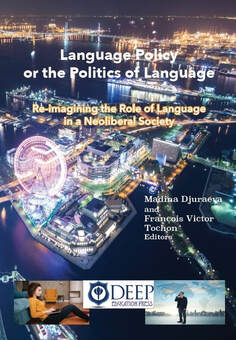Language Policy or the Politics of Language - Madina Djuraeva and Francois Victor Tochon

This book is designed for a wide audience of readers looking to learn about the ways globalization and neoliberalism affect language policy and education among social and linguistic groups in various corners of the world. In addition to learning about new approaches to studying people’s experiences at the nexus of language and neoliberalism, readers will also learn more about the linguistic rights of relatively understudied communities such as Native Americans in the U.S., Azerbaijanis in Iran, Tatars in Russia, Kurds in Turkey, and Uyghurs in China. Moreover, the audience will find useful perspectives on multilingual and foreign language education in South Korea, China, U.S. and Spain presented through the various lenses, one of which is translanguaging. Finally, readers will be pleasantly surprised by the theoretical and methodological discussions around discursive practices of American immigrant communities with regards to language and neoliberalism.
PDF E-Book Available on Our WebsiteContents
Introduction. Re-imagining the Role of Language in a Neoliberal Society. Madina Djuraeva, University of Wisconsin-Madison. PART I. Politics of Language: Minority groups and Language Education 1. Erasure and Sovereignty in American Higher Education. Mel M. Engman and Kathryn Stemper, University of Minnesota. 2. Language Ideologies and the Politics of Language: Azerbaijanis in Iran. Farzad Karimzad, University of Illinois at Urbana Champaign. 3. Language use and education in Islamic religious institutions of Tatarstan (Russia). Gulnaz Sigbatullina, Leiden University Centre for Linguistics. 4. The painful struggles of Kurds: Kurdish language education in neoliberal Turkey. Yao-Kai Chi, University of Wisconsin-Madison. 5. Language Education Policy in Xinjiang in the Neoliberal Era. Yuting Lan, University of Wisconsin-Madison. PART II. Neoliberalism and Foreign Language Education Policy 6. Towards a Neoliberal Society: English Language Education in South Korea. Jungwon Hyun and Jaerin Ahn, University of Wisconsin-Madison. 7. A Study of English Curriculum Policies in Universities of Zhejiang Province, China. Ming Hong, College of Foreign Languages, Zhejiang Normal University, China. 8. Language Education Policies in Henan, China: Restrictions, Opportunities and Strategies. Dan Jiao, Henan University of Technology, China. |
PART 3. Globalization and Language Education: Current Practices and Future Recommendations
9. Contesting Language Policies and Practices in Multilingual American Classrooms. Mariana Castro, University of Wisconsin-Madison. 10. Anthropophagic World Language Education for an Educated, Compassionate Citizenry. Michael Allred, University of Wisconsin-Madison. 11. Flamenco as a cross-cultural tool to teach Spanish in the neoliberal society. María Teresa Díaz Mohedo & Alejandro Vicente Bújez, University of Granada- Spain. PART 4: Language and Discourse in Neoliberal society. 12. Reification of the English Language and the Hegemonic Turn. Timothy Reagan, University of Maine and Terry A. Osborn, University of South Florida-Sarasota. 13. Exclusionary language: English, social class, and neoliberalism in an elite Chinese University. - Paul C. Madden, Zhejiang University. 14. English Learning Benefits for Chinese Immigrants in Ethnic Enclave Areas. Yanli Timm, University of Wisconsin-Madison. 15. Fate, forehead and the neoliberal subject: Uzbek immigrant women’s discourses of success. Lydia Catedral, University of Illinois at Urbana-Champaign. Conclusion. The Turn Toward Deep Value. Francois Victor Tochon, University of Wisconsin-Madison. |



